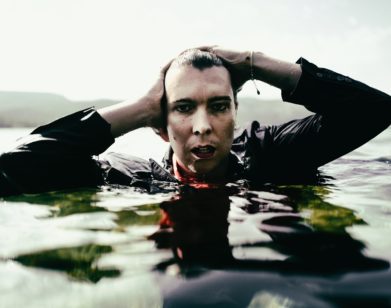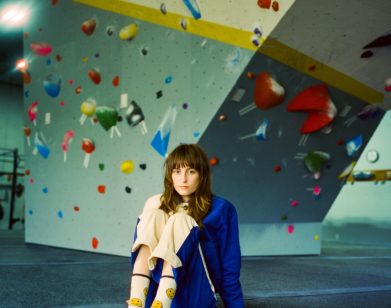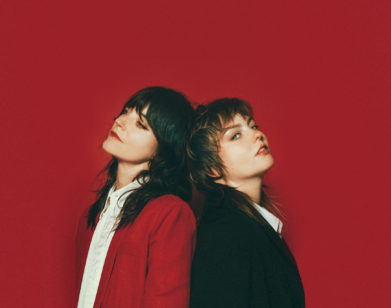in conversation
Angel Olsen and Brie Larson on Being Alone When Everyone is Watching
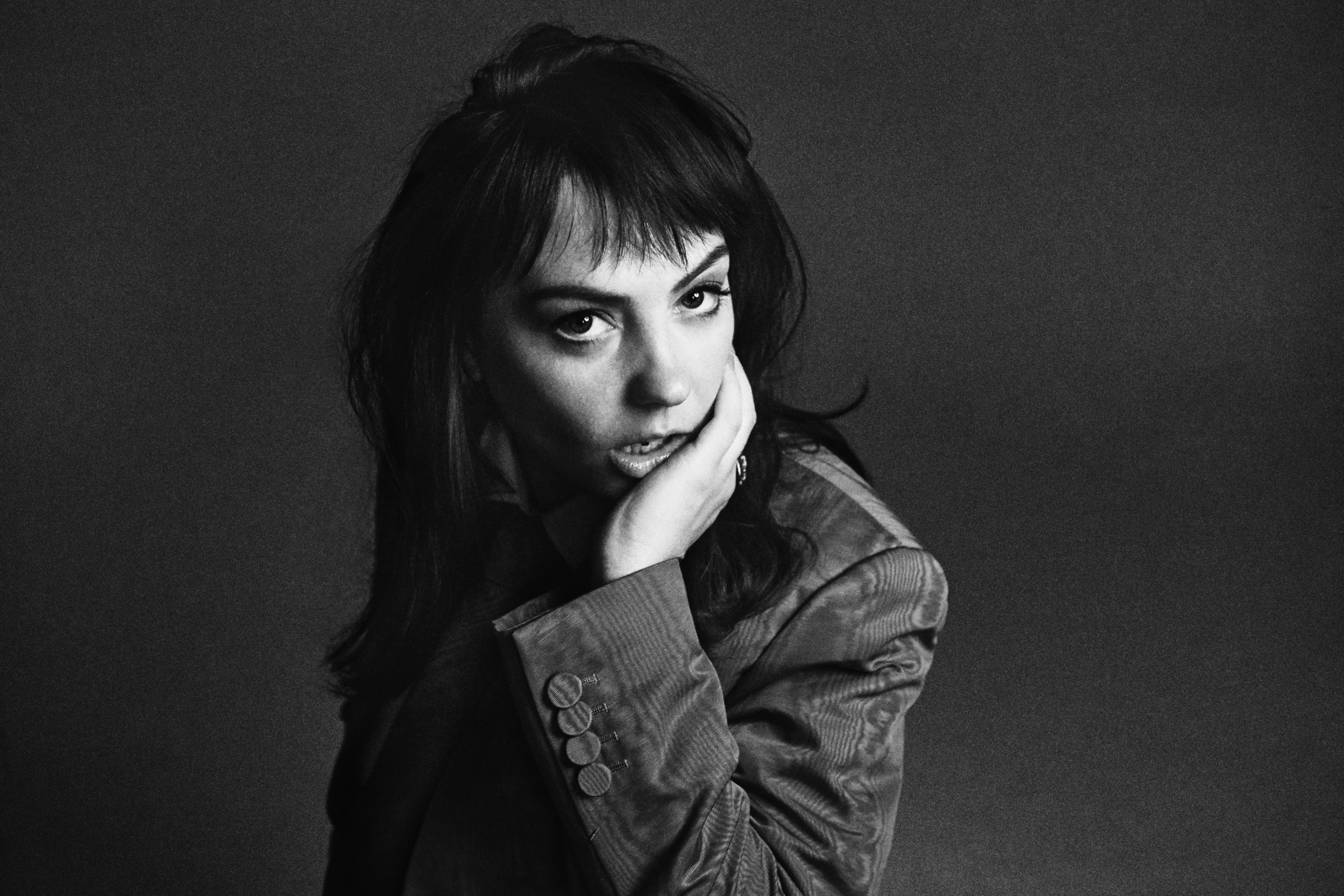
Photos by Kylie Coutts.
It’s become a cliché by now that art is getting us through the times, but sometimes is it true. Amidst a sea of reality shows, remixes, and socially distanced everything, few works have so prophetically captured the distinct mood of state-sanctioned isolation as Whole New Mess. A breakup album in theory but a reckoning in practice, the album finds the indie icon in North Carolina’s Blue Ridge mountains, self-isolating before it was standard, struggling to enjoy the air in her lungs with no one beside her. Unlike its predecessor, the critically-acclaimed All Mirrors, A Whole New Mess is stripped down and searching, marking new levels of vulnerability for the artist as her reverb echoes through an empty old church. Getting back to nature has been a common salve for those searching for space in an infected world; the words “breath of fresh air,” while hackneyed, have never felt more resonant. For Olsen, who lives in Asheville, North Carolina, that means taking off her makeup and going into the woods, or wandering to a lake and talking to a 90-year-old man with an anti-Trump magnet on his car. For her friend, the decorated actor and unapologetic Olsen fan Brie Larson, it means long walks and gardening, and listening to Olsen while she’s doing it. After many rounds of repeat listening, Larson called up Olsen to discuss growth, in all its forms. —SARAH NECHAMKIN
———
BRIE LARSON: So, we met on the internet.
ANGEL OLSEN: We met on the internet. We did have a really nice dinner date, though.
LARSON: Before we weren’t able to go out in the world.
OLSEN: I told you about my Lifetime movie life.
LARSON: It was so exciting. You know that I love Lifetime movies. All I wanted to do was talk about that. How are you?
OLSEN: I’m alright. I’m sitting on my back porch, but if it’s too loud, I can move inside. I just mowed my yard.
LARSON: Oh, that sounds really soothing. I’ve been gardening more, and it’s been so nice. There’s just something about tending to the earth. It’s like it’s still part of us and yet I’ve maintained the belief that I didn’t have time for it previously.
OLSEN: And seeing all the things you’re growing. I discovered a lake in the neighborhood, and I’ve been going out on the lake with my friends. There’s an older man in Asheville who is letting people use this lake and use his canoe. That’s been nice to break up work stuff with—something immediately in the city that feels like it’s not.
LARSON: You found a hidden lake?
OLSEN: Well, it’s not really hidden. He’s trying to buy a property so that they don’t cut down all the trees in the neighborhood. I went by and I started talking with him today, and we talked about everything that’s going on in the world. It was a really sweet interaction. He said, “I have to take the anti-Trump magnet off my car when I go out because sometimes people in the neighborhood give me weird looks.” I don’t know how he did it, but he made his own personal anti-Trump magnet and put it on the side of the car. This man is 90 years old.
LARSON: I didn’t even know you can put magnets on your car. So, thanks for that.
OLSEN: He’s very concerned about what’s going on in the world. It’s weird to hear that from someone who lived during a time when we thought we were fighting fascism in the world.
LARSON: It’s an interesting time, and I will say that getting to listen to this new album has given me a lot of canvas to project onto this. It has its own energy to it.
OLSEN: It’s hard for me to listen to those recordings because I was really still in a lot of those feelings when I recorded it. It’s harder for me to listen to that one than it is to listen to All Mirrors, because All Mirrors is just like theatrical performance. With Whole New Mess—I was still in the mess, and I felt raw in it.
LARSON: What made you want to release it now?
OLSEN: We were planning on releasing it in the fall, and I’ve already released most of the material in some form already. But also because I feel that solo material is reflective, and we’re in this reflective time as a country and in the world. All of my relationships have suffered because of this thing that shares all of these feelings for people that can feel safe and happy in my songs or feel that they aren’t as isolated, but I was starting to feel really isolated myself, and I didn’t have anyone to really turn to. Now, listening to it, I can see the material relating to the world, but it doesn’t necessarily have to be read that way. I hope that people would be able to take something out of it that can inspire them and make them feel reflective on their own lives and their own misplacements.
LARSON: I was exhausted—I’m just exhausted all the time from maxing myself out, trying to scream into the void—and I had taken a shower and I laid down and put headphones on, and then the song [“Whole New Mess”] started and it just felt so crazy. There’s just certain times in your life where it’s just those weird feelings, the right song at the right time. It almost feels spooky. It spooked me a little bit to be like, “How could this exist? This is saying exactly what I’m feeling in this moment and yet somehow it’s about something totally different from years ago.” And that feels like the closest thing to perfection that I know how to experience.
OLSEN: I really appreciate that that is how it was articulated in your mind when you heard it. Because that’s my overall intent when I make anything. All Mirrors, it’s me being like, “Okay, I’m playing the game, I’m really doing it. We’re going to put my face on billboards, we are going to make videos that are epic, we’re going to act as if this is a movie and not actually just a record.” I love dressing up and I love acting that part, but I also was admitting to myself that it wasn’t just a character—it was my life, too. I feel like it’s so important to just say something and have it be about the words and the voice and that’s it. People are still afraid to do that.
LARSON: Why do you think that is?
OLSEN: I think people are afraid that it’ll just be boring or something, but to me it’s only boring if it’s not about anything. It was crazy to listen to the original version of “Tonight” [from All Mirrors] and hear how positive it feels.
LARSON: It was so stripped down, it really was just you saying words simply. And I realized that it had a whole new meaning for me. I thought that that song was so sad. All the other songs with “without you” are crazy sad heartbreaking ballads about the thought of being without. And then I realized how smart it was that you talked about it in the form of not a without, but a gain in some way. Am I thinking about it too much?
OLSEN: No. When I was recording with both Michael Harris and John Congleton, who recorded All Mirrors, they both said something like, “That is a really calm, mean thing to say about someone.” Just like, I am actually really, really good without you and I like my life a whole lot more. I like my thoughts, I like the air that I breathe, I like the way that I spend my time, and I don’t need you to define my happiness anymore. And I think that that’s something that I’m continually working on in the relationships that I dive right into. Part of growing up is realizing that you can really love someone and mean all of the things that you’ve said and done with them and want to continue, but it’s not everything.
For me, I didn’t know that I could be alone. I put myself in relationships over and over again, and I volunteered myself to be smaller and to be the one who catered to other people’s feelings and needs. I still struggle with that. I fell into this thing where I just allowed people to do simple things for me. And then I realized that, actually, when these people were out of my life, I felt really good alone. It sounds so silly.
LARSON: I don’t think so.
OLSEN: I bought a house as a woman that’s not married, and I never thought that I would be in that position, or that I would even not be anxious about every step. I just got to a point where I realized there are so many things in my life that I will die not knowing, and one of them is not going to be as stupid as me not knowing how to pay a bill or how to confront someone about my feelings or how to talk about my financial needs and break it down. I don’t need a relationship to help me do that—I can do that on my own.
I know it’s simple, but my parents were really old-fashioned. My mom was in her late seventies, my dad’s 90 now. I was adopted into this family where they had already raised all these kids and I was the youngest. My mother never sat me down and showed me how to do basic things, like open a bank account. My dad would be the person to do that. I always hated it. I leaned so heavily on partners to grow up for me that I didn’t get the opportunity to grow up and see these things in my life that I could actually do.
LARSON: As you’re saying all of this, my brain can’t help but think, All Mirrors is simultaneously you growing and expanding and building this thing, and diving into the unknown and allowing yourself to be this larger-than-life thing. And then Whole New Mess sounds like it’s honoring your inner child and saying, “Listen, I can grow and I can be all these things and I’m learning how to have healthy relationships with other people while also, at the same time, honoring myself first.”
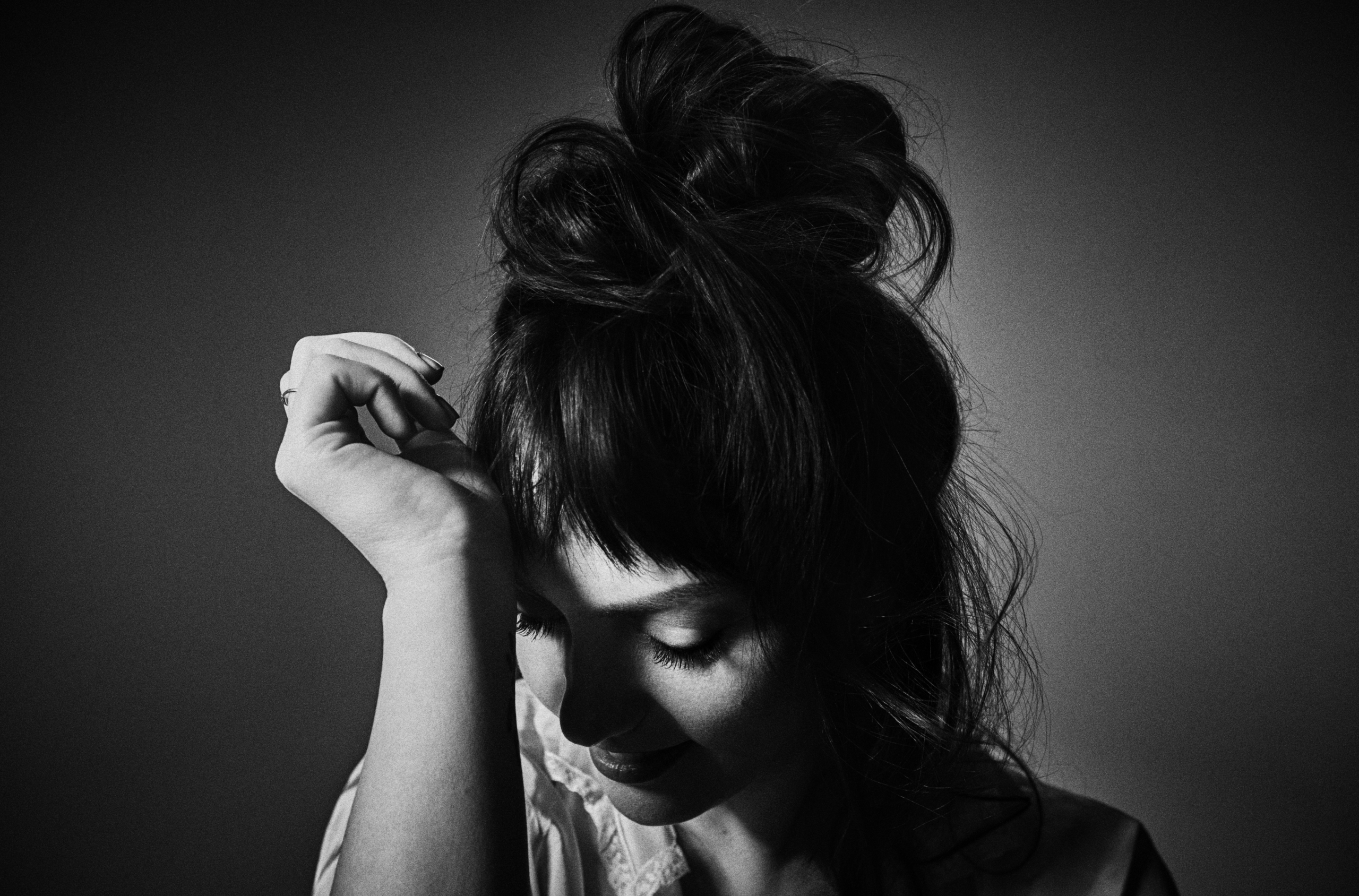
OLSEN: Yeah, I absolutely want to do that. In between recording Whole New Mess and the end of my tour cycle, we ended at Coachella, and I don’t love Coachella as an ending for an era, but it was the end of a chapter. I had my cat as the background onstage. It was really fun, but I was secretly relieved to just spend some time alone and reflect on what it means to be in a band and how many years I would dedicate my body to that lifestyle. I don’t love not being home. My favorite thing is to come home and take off all the makeup and go into the woods and be with friends that don’t care what I do for a living and just talk about their lives and things we’re thinking about. That is what grounds me and makes me feel like a person that exists. I know I have to make a living, and in order to continue writing songs that I believe in, it’s nice to have an audience to support that. But I also get tired of all the BS. Playing solo and having an option to do a mellow tour in my future has been really ideal to me. Sometimes, I have to perform for the people I’m working with. I’m learning that not everyone needs to know everything.
LARSON: I’ve been trying to do the same thing.
OLSEN: Just like any job, you have your really good days where you feel connected and powerful, like you have purpose. And then you have those moments where you’re questioning who you are because of the way you handled yourself in an interview or a photo shoot—was that in line with your values, was that in line with your identity? It took me a long time to even be able to put my face on billboards or spend money on stuff like that. But I feel confident about the things that I’m writing enough to support them and promote them, so I don’t think that’s evil.
LARSON: I struggle with press days because it’s remarkably vulnerable. I fought against doing press for most of my career, and I felt deep discomfort getting ready for things, or even brushing my hair. And I think the only way for me to move with it is exactly what you’re saying, which is recognizing that there’s no way to do it perfect the whole time. It’s a tough thing. How do you do it in a way that still allows for people to have their own experience and for there to be some mystery involved in the process in a time where there’s just so much conversation about everything?
OLSEN: I’m unlearning a lot of stuff, and I’m trying to figure out how to be active on social media in a way that I’ve never been active before, touching upon or reposting articles that I think are interesting and informative. I’ve always considered myself worldly because I travel quite a bit and I’ve learned things about different cultures, but what I wasn’t informing myself on was how to say things out loud—not as somebody with celebrity, but as a human. Everyone in 2020 can have their own platform, but we have an audience already, so when you have an audience and you want to share important work that you care about, it’s only then another step forward to share what you think about the world. It’s a brave thing to do that, but you know what’s braver than that? People who are actually suffering and who don’t have a platform at all. That’s brave living.
LARSON: Do you worry about being misunderstood?
OLSEN: Yes and no. I don’t often read articles written about me. I’ll probably read this one. Words can just be construed so easily. Curiosity in general can be misconstrued as supportive. So it’s tricky right now to post anything, but I’m at this point where I’ve just said, “I’m going to make mistakes and that’s okay.” And everyone’s going to make mistakes. I’m okay with dealing with that. As far as my my music and my life, it bums me out when I am misunderstood, but what I need is very simple. I only need a handful of really close friends to understand me and work with me and grow with me. I don’t need to be understood by my audience. They don’t need to be my support system.
LARSON: That sounds healthy. Hearing you talk about this stuff, there’s obviously a lot that I relate to in navigating there being an audience for even the most basic of tasks. Suddenly things that maybe aren’t interesting normally, are interesting. I just find that to be a very unique experience.
OLSEN: Yeah, it’s hard out there. I don’t have quite the audience that you have, but in a small town, it is hard to go to the grocery store or anywhere without feeling like people are changing for you. It’s hard to get to know new people and trust that they don’t want something from you. I want to reach out to people on your level and be like, “Hey, I need some help.” But then I just feel like I’m so direct with people that it doesn’t always work, and they’re like, “You’re a psycho.”
LARSON: What? If you ever needed help, you know that I would…
OLSEN: I’m not talking about you. There’s a circle of people who are not very welcoming and will just ghost you and fall off, but show up at my shows. I don’t really do the transactional friendship thing well, but at the same time, it’s nice to meet people who are dealing with the same isolation and responsibility of feeling responsible for our audience, or feeling responsible for things that sometimes are completely out of our control. I’ve learned as a practice to always be really kind to people if they recognize me or want to talk with me because it might just be the most crazy day for them, but I’ve also learned to say, “Hey, it was so nice to meet you. I don’t really feel like a photo right now, but I hope you have the best day.”
LARSON: You do that too? That’s what I do.
OLSEN: All the time.
LARSON: Oh my gosh, that’s so funny. I’ve had other, even more famous people that I’ve been with, be like, “Brie, you waste so much time, just take the photo.” And I’m like, “No, but I really want the interaction. I don’t want to feel like I’m just here for the Instagram.” I’d much rather actually take more time and feel like there was a connection and that we’re building community, rather than just be like, “Okay, I’m here.”
OLSEN: Like you’re a doll that somebody ran into. I think it’s difficult to describe the isolation that comes along with this thing that we do. It’s not something that you can really complain about, because we’re so lucky and blessed to be in the position in the first place, but we’re also just human and we’re allowed to make mistakes and we should be allowed to explore that and have our own healing process. A lot of this record is just me trying to be okay with balancing both worlds, the personal and the creative, and I think I’ll probably always be trying to do that.
LARSON: I was thinking about that today as I was listening to your record. Music has this way of punctuating and underscoring and literally harmonizing with whatever situation the person’s in that’s listening to it. I could listen to it while I was going for a walk, and while I was in the garden and while I was processing my own thoughts, but I can’t bring a movie with me as I’m walking. I mean, I guess I could, but that’d be weird. I’ve always appreciated the thought that you’ve put into it and what you’ve chosen to share. I feel a connectivity with it. And, I would say, based upon the fact that I’m interviewing you for Interview Magazine, that other people think that, too.

